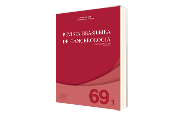Tendências de Pesquisa na Internet sobre Câncer de Mama entre 2017 e 2021 no Brasil: uma Investigação de Infovigilância
DOI:
https://doi.org/10.32635/2176-9745.RBC.2023v69n1.3072Palavras-chave:
neoplasias da mama/epidemiologia, fatores de tempo, comportamento de busca de informação, internet, ferramenta de buscaResumo
Introdução: Os usuários da Internet frequentemente buscam informações sobre questões de saúde. O comportamento desses usuários pode estar relacionado com contextos de saúde vivenciados em suas comunidades, refletindo demandas não supridas. Objetivo: Examinar o interesse dos usuários da Internet sobre o câncer de mama no Brasil, considerando o período entre 2017 e 2021. Método: Estudo infodemiológico utilizando o volume relativo de busca (variando entre 0 e 100) para o termo “câncer de mama” no Brasil, recuperado da ferramenta Google Trends. O volume relativo de busca entre os anos foi comparado com abordagem não paramétrica e valor de significância (p) de 5%. Resultados: Exceto entre 2019 e 2020 (p-valor>0,05), houve um aumento significativo nas buscas na Internet pelo termo “câncer de mama” no Brasil (todos os valores de p<0,05). O pico de interesse (volume relativo de busca=100) foi observado no mês de outubro de 2020. Os usuários da Internet que buscaram pelo termo “câncer de mama” frequentemente procuravam por sinais e sintomas do câncer de mama. Conclusão: Observou-se que o interesse desses usuários sobre câncer de mama aumentou nos últimos anos no Brasil.
Downloads
Referências
Marques NP, Silveira DMM, Marques NCT, et al. Cancer diagnosis in Brazil in the COVID-19 era. Semin Oncol. 2021;48(2):156-9. doi: https://doi.org/10.1053/j.seminoncol.2020.12.002 DOI: https://doi.org/10.1053/j.seminoncol.2020.12.002
Ferreira MC, Vale DB, Barros MBA. Incidence and mortality from breast and cervical cancer in a Brazilian town. Rev Saude Publica. 2021;55:67. doi: https://doi.org/10.11606/s1518-8787.2021055003085 DOI: https://doi.org/10.11606/s1518-8787.2021055003085
Snyder A, Jang S, Nazari IS, et al. Google search volume trends for cancer screening terms during the COVID-19 pandemic. J Med Screen. 2021;28(2):210-2. doi: https://doi.org/10.1177/0969141321999426 DOI: https://doi.org/10.1177/0969141321999426
Berning P, Maybody M, Deipolyi AR, et al. Internet search trends relevant to interventional oncology: a Google Trends study (2004-2020). J Vasc Interv Radiol. 2021;32(10):1445-1448.e1. doi: https://doi.org/10.1016/j.jvir.2021.07.005 DOI: https://doi.org/10.1016/j.jvir.2021.07.005
Vasconcellos-Silva PR, Carvalho DBF, Trajano V, et al. Using Google Trends data to study public interest in breast cancer screening in Brazil: why not a pink February? JMIR Public Health Surveill. 2017;3(2):e17. doi: https://doi.org/10.2196/publichealth.7015 DOI: https://doi.org/10.2196/publichealth.7015
Sá MFS. Pink October and breast cancer in Brazil. Rev Bras Ginecol Obstet. 2021;43(10):725-7. doi: https://doi.org/10.1055/s-0041-1739451 DOI: https://doi.org/10.1055/s-0041-1739451
Quintanilha LF, Souza LN, Sanches D, et al. The impact of cancer campaigns in Brazil: a Google Trends analysis. Ecancermedicalscience. 2019;13:963. doi: https://doi.org/10.3332/ecancer.2019.963 DOI: https://doi.org/10.3332/ecancer.2019.963
Google Trends [Internet]. Mountain View, CA: Google; [1999]. [acesso 2022 mar 25]. Disponível em: https://trends.google.com.br/trends
Mavragani A, Ochoa G. Google Trends in infodemiology and infoveillance: methodology framework. JMIR Public Health Surveill. 2019;5(2):e13439. doi: https://doi.org/10.2196/13439 DOI: https://doi.org/10.2196/13439
Mavragani A, Ochoa G, Tsagarakis KP. Assessing the methods, tools, and statistical approaches in Google Trends research: systematic review. J Med Internet Res. 2018;20(11):e270. doi: https://doi.org/10.2196/jmir.9366 DOI: https://doi.org/10.2196/jmir.9366
Nuti SV, Wayda B, Ranasinghe I, et al. The use of Google Trends in health care research: a systematic review. PLoS One. 2014;9(10):e109583. doi: https://doi.org/10.1371/journal.pone.0109583 DOI: https://doi.org/10.1371/journal.pone.0109583
Venegas-Vera AV, Colbert GB, Lerma EV. Positive and negative impact of social media in the COVID-19 era. Rev Cardiovasc Med. 2020;21(4):561-4. doi: https://doi.org/10.31083/j.rcm.2020.04.195 DOI: https://doi.org/10.31083/j.rcm.2020.04.195
Gottlieb M, Dyer S. Information and disinformation: social media in the COVID-19 crisis. Acad Emerg Med. 2020;27(7):640-1. doi: https://doi.org/10.1111/acem.14036 DOI: https://doi.org/10.1111/acem.14036
Kemp E, Koczwara B, Turner J, et al. Internet use and preferences among women living with advanced breast cancer. Breast J. 2019;25(2):290-5. doi: https://doi.org/10.1111/tbj.13203 DOI: https://doi.org/10.1111/tbj.13203
Kemp E, Koczwara B, Butow P, et al. Online information and support needs of women with advanced breast cancer: a qualitative analysis. Support Care Cancer. 2018;26(10):3489-96. doi: https://doi.org/10.1007/s00520-018-4206-1 DOI: https://doi.org/10.1007/s00520-018-4206-1
Lee K, Hoti K, Hughes JD, et al. Dr Google and the consumer: a qualitative study exploring the navigational needs and online health information-seeking behaviors of consumers with chronic health conditions. J Med Internet Res. 2014;16(12):e262. doi: https://doi.org/10.2196/jmir.3706 DOI: https://doi.org/10.2196/jmir.3706
Downloads
Publicado
Como Citar
Edição
Seção
Licença
Os direitos morais e intelectuais dos artigos pertencem aos respectivos autores, que concedem à RBC o direito de publicação.

Este trabalho está licenciado sob uma licença Creative Commons Attribution 4.0 International License.









